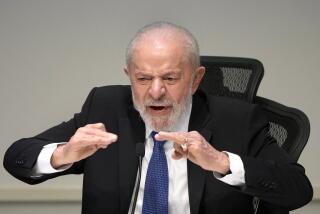Brazil Faces Choice of Visions
RIO DE JANEIRO — The top two finishers in Brazil’s presidential election began a three-week runoff campaign Monday that promises to present voters with two very different visions of the future of this economically troubled country.
Luiz Inacio Lula da Silva, the leftist Workers Party candidate, will take a big lead into the Oct. 27 election, having won 46% of the vote in Sunday’s first round, double the total of the second-place finisher, Jose Serra of the ruling Social Democratic Party of Brazil.
But political analysts say the Workers Party candidate, known here simply as Lula, will face big challenges in his effort to become president of Latin America’s largest country. He could easily be done in by the complex web of inter-party alliances that are a constant backdrop to Brazilian politics.
Lula has performed well in the early stages of previous elections--this is his fourth run for president--only to see his campaign falter in the home stretch.
Already on Monday, with the last first-round ballots still being counted, Lula’s campaign was encountering new obstacles.
Anthony Garotinho, who finished third with 18% of the vote, said he had presented Lula with conditions for supporting him in the second round. Garotinho complained about the Workers Party’s alliances with right-wing political bosses in northeastern Brazil, including former President Jose Sarney.
“Lula is with Sarney, with those politicians who brought Brazil down,” Garotinho said. “If he wants our support, he’s going to have to think about who he makes friends with.”
Serra faces an even steeper climb after winning just 23% of the vote Sunday.
More than three-quarters of the Brazilian electorate voted for left and center-left candidates, in a loud rejection of the pro-market policies of outgoing President Fernando Henrique Cardoso, who picked Serra to be his successor.
Milton Seligman, campaign coordinator for Serra, asked the losing candidates to “stop, think and look in the eyes of the [two remaining] candidates and pick the one who is best prepared to govern Brazil.”
David Fleischer, a political science professor at the University of Brasilia, said both candidates risk having first-round allies desert them. In the first round, Lula received the support of the right-wing Liberal Front, or PFL, the largest party in the lower house of Congress.
“A large part of the PFL is considering moving to Serra,” Fleischer said. The party was a member of Cardoso’s ruling coalition but pulled out earlier this year after accusing Cardoso of torpedoing the campaign of Liberal Front presidential candidate Roseana Sarney, daughter of the former president, who resigned in the wake of a corruption scandal.
Serra will also have to decide whether to run on Cardoso’s economic policies or break formally with the president. Up to now, Serra has issued vague pronouncements about “change” without directly criticizing the government’s stewardship of the economy.
“It’s a very hard call to make, but he’s going to have to decide one way or the other,” Fleischer said.
About 115 million people cast ballots in Sunday’s vote, in which all congressional seats, part of the Senate and all 26 governorships and state legislatures were at stake.
On a regional level, too, the vote announced a changing of the guard, with many veteran politicians losing. In the state of Alagoas, former President Fernando Collor de Mello, who was impeached on charges of corruption in 1992, lost to Socialist Party incumbent Ronaldo Lessa.
“Collor will never win an election in Alagoas,” Lessa said Sunday after casting his vote. “The only place he can win is in Miami,” he added, referring to the city where Collor once lived in exile. It is a favorite destination of wealthy Brazilians.
Lula’s Workers Party added 10 seats in the Senate and increased its block in the lower house, the National Congress, though it will still remain a minority party in both houses.
Still, the memory of past debacles haunts the party’s leaders.
In 1989, Lula lost the presidency to Collor in a runoff amid widespread charges of fraud. In 1994 Lula led in early polls only to lose to Cardoso.
But the Workers Party has never won as big a chunk of the Brazilian electorate as it did Sunday.
“We have achieved the greatest victory ever for a leftist party in Latin America,” Lula said at a news conference Monday. “The people have voted against an economic model, against dependency, and for a new direction for our country.”
Lula also spoke late Sunday with the fourth-place finisher in the race, Ciro Gomes of the People’s Socialist Party, or PPS, who was a finance minister in the mid-1990s. Gomes took 12% of the vote.
“I think we can make an alliance with the PPS because in the election the PPS ran a campaign against the government,” Lula said Monday.
Perhaps the loudest voice heard in favor of a Serra presidency came, once again, from Brazil’s financial markets, which prefer the ruling party candidate because he is more likely to continue Cardoso’s policies of fiscal austerity. Lula’s strong showing sent both the Sao Paulo stock market and Brazil’s currency, the real, tumbling.
The value of the dollar climbed from 3.62 to 3.68 reals, while the Bovespa stock index fell 4%.
*
Times staff writer Chris Kraul in Sao Paolo contributed to this report.
More to Read
Sign up for Essential California
The most important California stories and recommendations in your inbox every morning.
You may occasionally receive promotional content from the Los Angeles Times.











